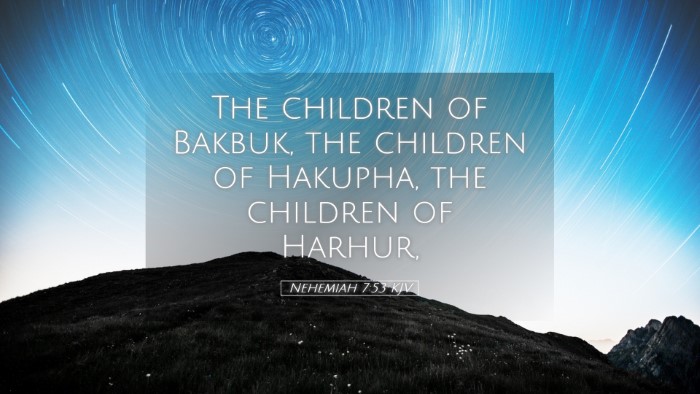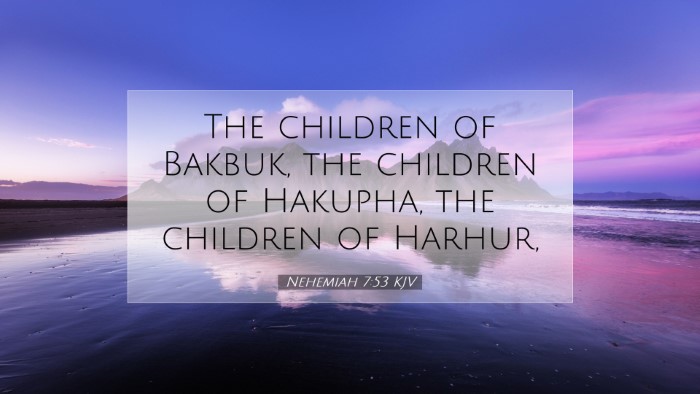Commentary on Nehemiah 7:53
Bible Verse: Nehemiah 7:53 - "The children of Bakbuk, the children of Hakupha, the children of Harhur."
Introduction
The verse Nehemiah 7:53 is part of a broader narrative concerning the restoration of Jerusalem and the return of the Jewish exiles from Babylon. In this particular verse, we find the names of three families who returned to Jerusalem. The reestablishment of the Jewish community in Jerusalem after the return from exile is marked by such records, which serve both a historical and theological purpose.
Contextual Overview
Nehemiah, a cupbearer to the Persian king, played a vital role in the rebuilding of Jerusalem’s walls. His leadership brought hope to a desolate people and rallied them towards a common purpose. The lists of returning exiles, of which this verse is a part, hold significance in documenting the remnant of God's people and reinforcing their identity.
Exegesis of the Verse
This specific verse lists three families, highlighting the importance of genealogy and family lineage in Jewish culture. Each family represented an aspect of the community’s heritage and contributed to the collective identity of the returning exiles.
- Children of Bakbuk: The name Bakbuk is considered by some scholars to indicate a "bottle" or "jar," symbolizing perhaps preservation or the containment of God's blessings.
- Children of Hakupha: This family name may symbolize a "gathering" or "assembly," reflecting the coming together of the people of God.
- Children of Harhur: The meaning of Harhur is less clear, but like many names in Scripture, it invites reflection on the nature of God's hidden providence in the lives of His people.
Theological Implications
The inclusion of these familial names in Nehemiah 7 serves to emphasize God's faithfulness in preserving a remnant during times of great trial. The families’ return can be interpreted as God's covenantal promise being fulfilled. Each family, with its unique name and history, illustrates the diverse yet unified nature of God's people.
Insights from Public Domain Commentaries
Matthew Henry
Henry emphasizes the significance of such lists as they show God’s regard for the people whose names are remembered. He remarks that God keeps a register of all His faithful servants and that names are not forgotten in the heavenly record.
Albert Barnes
Barnes points out that these genealogical records were useful in distinguishing the legitimate worshippers of God from other inhabitants of the land. He sees this as a reinforcement of the Holy character expected of those who worship within God’s established city.
Adam Clarke
Clarke provides an analysis of the families mentioned, noting that they represent specific tribes and their distinguished histories. He highlights that such records serve to remind the people of their roots and the foundational roles these families would play in the reconstruing of Jerusalem.
Practical Applications for Pastors and Scholars
For pastors, the significance of names and genealogy underscores the value of history in the church. It becomes crucial to trace back the heritage of faith and the stories that shape contemporary worship. This verse invites reflection on how each individual contributes to the communal life of the church.
For scholars, Nehemiah 7:53 prompts a deeper investigation into the cultural and historical context of the exiles. It serves as an example of how understanding the past can illuminate current practices, as reflected in theology, worship, and communal identity.
Conclusion
Nehemiah 7:53, while seemingly a mere list of names, carries profound implications regarding identity, community, and God’s unwavering faithfulness. As the modern church reflects upon its own genealogical bearings, there is an invitation to appreciate the rich tapestry of faith that binds individuals into a larger purpose for God's kingdom.


